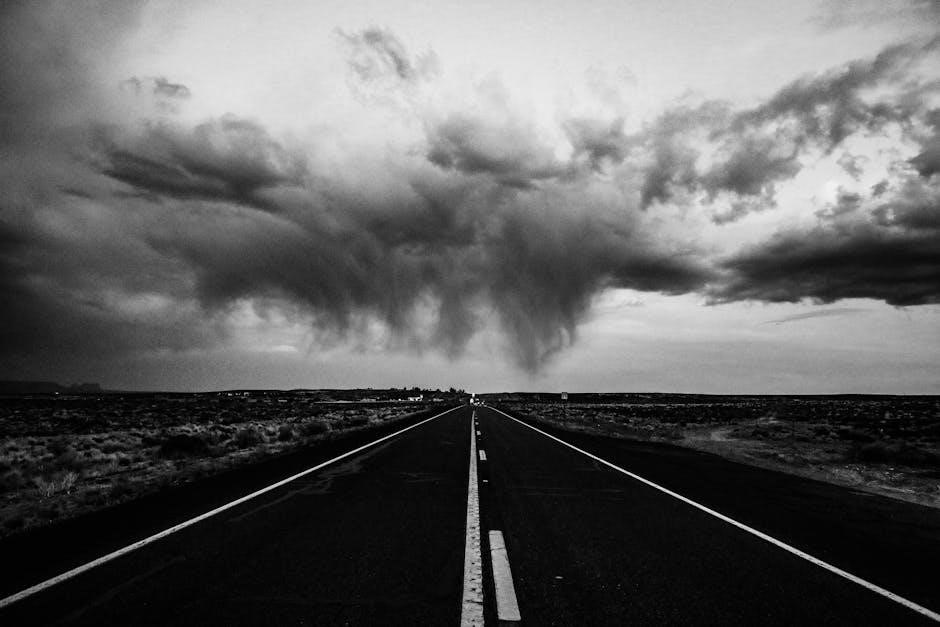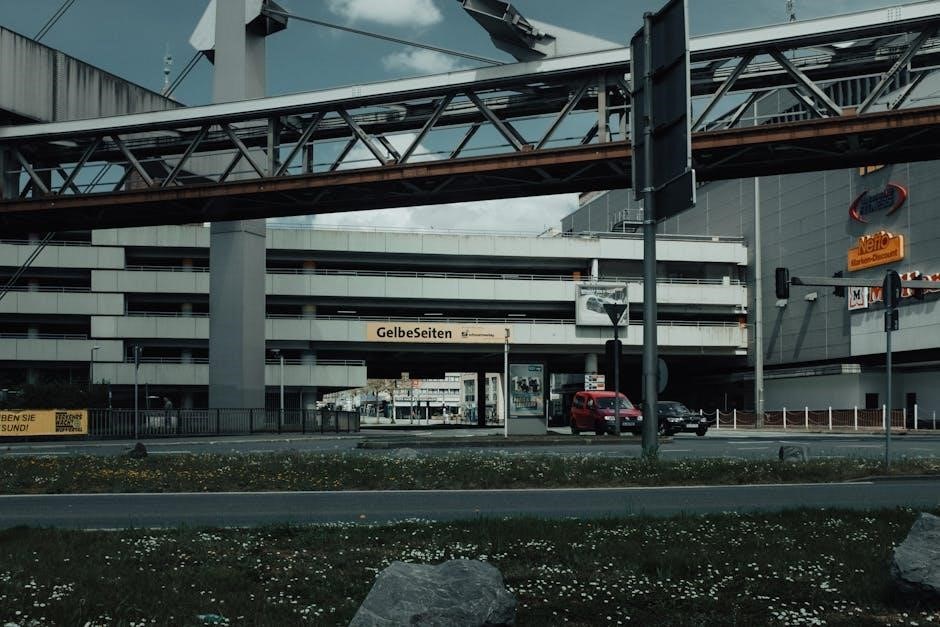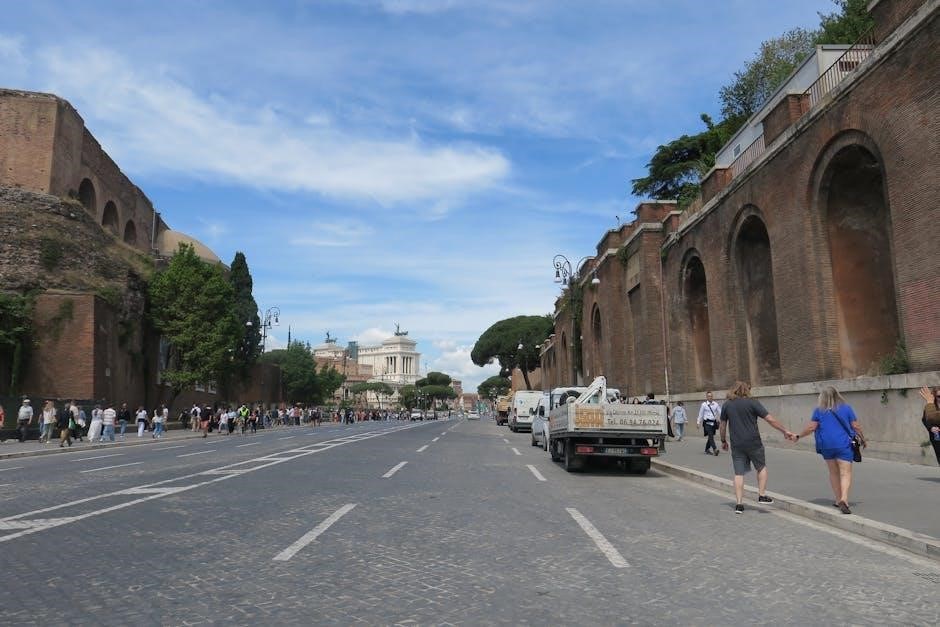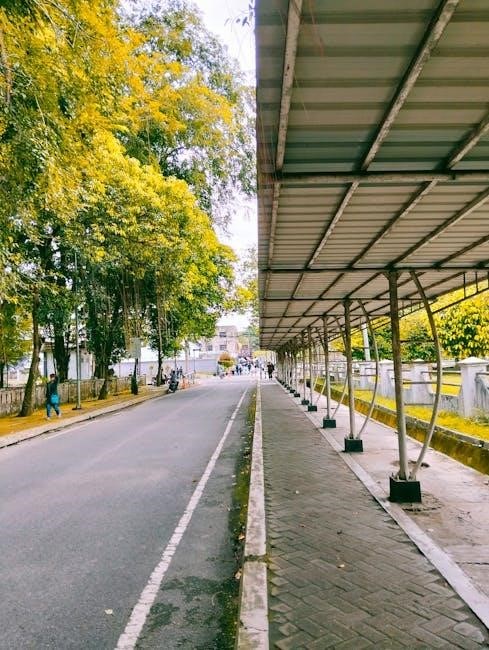Cormac McCarthys The Road is a haunting post-apocalyptic novel about a father and son navigating a barren world, exploring themes of survival, love, and hope in a 287-page masterpiece.
Overview of the Novel
The Road by Cormac McCarthy is a post-apocalyptic novel that follows a father and son as they navigate a barren, ash-filled world devastated by an unnamed catastrophe. The story explores themes of survival, paternal love, and the struggle to maintain humanity in a world devoid of hope. The 287-page PDF version captures the essence of McCarthy’s minimalist prose, offering a gripping narrative that oscillates between moments of despair and fleeting glimpses of beauty. The novel’s sparse dialogue and vivid imagery underscore the harsh realities of their journey, while the bond between the father and son serves as a beacon of resilience. This Pulitzer Prize-winning work is widely regarded as a modern classic, with its PDF format making it accessible to readers worldwide.
Importance of the 287-Page PDF Version
The 287-page PDF version of The Road by Cormac McCarthy is a crucial format for accessing this Pulitzer Prize-winning novel. It offers readers a convenient and portable way to engage with the story, ensuring that McCarthy’s haunting prose and profound themes reach a broad audience. The PDF preserves the original text’s integrity, allowing readers to experience the father-son journey in a post-apocalyptic world with clarity. Its digital format makes it easily shareable and accessible across devices, contributing to the novel’s widespread popularity and critical acclaim. This version is particularly valued for its ability to maintain the emotional depth and literary complexity of the original work, making it a preferred choice for both casual readers and academic studies.

Author Background
Cormac McCarthy, born in 1933 in Rhode Island, grew up in Tennessee and Washington. Originally named Charles, he adopted the Irish name Cormac. Known for minimalist prose, McCarthy explores human resilience and morality through his works, including The Road, which reflects his unique literary style and thematic depth.
Cormac McCarthy: Biography and Literary Career
Cormac McCarthy, born in Rhode Island in 1933, spent his childhood in Tennessee and Washington. His early life influenced his writing, which often explores human resilience. McCarthy’s literary career spans over six decades, with his unique minimalist style gaining acclaim. His works, such as The Road, delve into themes of survival and morality, reflecting his profound understanding of human nature. The 287-page PDF version of The Road encapsulates his ability to weave compelling narratives, solidifying his legacy as a master of contemporary literature. McCarthy’s dedication to storytelling continues to captivate readers and inspire new generations of writers.
McCarthy’s Writing Style and Themes
Cormac McCarthy’s writing style in The Road is characterized by minimalist prose, stripped of ornamentation, mirroring the desolate world he portrays. His use of sparse, direct language intensifies the emotional weight of the narrative. Themes of survival, paternal love, and morality dominate the story, set against a backdrop of environmental collapse. McCarthy’s exploration of human resilience and the struggle to maintain hope in a broken world resonates deeply. The 287-page PDF version captures his ability to evoke profound emotions through simplicity, making The Road a powerful exploration of humanity’s darkest and most enduring qualities.
The Road as McCarthy’s Magnum Opus

The Road is widely regarded as Cormac McCarthy’s magnum opus, a masterpiece that showcases his unique storytelling ability and philosophical depth. The novel’s haunting narrative of a father and son’s survival in a post-apocalyptic world has resonated deeply with readers, earning it the Pulitzer Prize in 2007. Its exploration of human resilience, paternal love, and morality in the face of unimaginable despair solidifies its place as McCarthy’s most impactful work. The 287-page PDF version has become a popular format for readers to experience this profound tale, further cementing its legacy as a modern literary classic. McCarthy’s ability to evoke emotion through sparse, powerful prose underscores why The Road remains his most celebrated novel.

Plot Summary
The Road follows a father and son’s perilous journey through a post-apocalyptic world, scavenging for survival, confronting moral dilemmas, and clinging to hope amidst unrelenting despair.
Setting: A Post-Apocalyptic World
The Road unfolds in a desolate, post-apocalyptic landscape where an unspecified cataclysm has ravaged Earth, leaving behind a barren, ash-filled environment devoid of sunlight and life. The world is eerily silent, with gray skies and skeletal trees dominating the horizon. Civilization has collapsed, and the few remaining survivors struggle in a harsh, lawless environment. The absence of nature’s vibrancy and the prevalence of decay create a haunting backdrop for the father-son duo’s journey. This bleak setting amplifies the novel’s themes of survival, hope, and humanity’s resilience in the face of unimaginable destruction.
Main Characters: The Father and the Son
The father and son are the central figures in The Road, their bond serving as the emotional core of the novel. The father, driven by paternal love and a will to survive, guides his young son through a devastated world. The son, embodying innocence and moral curiosity, questions the harsh realities surrounding them. Their relationship is marked by mutual dependence, with the father striving to protect and teach his son, while the son reminds his father of humanity’s enduring spark. Both remain unnamed, symbolizing their universality as representatives of human resilience. Their dialogue and interactions reveal their characters, highlighting the depth of their connection amidst unimaginable adversity.
Plot Structure: Journey and Survival
The Road follows a linear narrative, detailing the father and son’s perilous journey through a post-apocalyptic world. Their daily struggles to find food, shelter, and safety dominate the plot, interspersed with flashbacks of the mother and the world before its collapse. The structure emphasizes their relentless march toward the coast, driven by hope for a better future. Key events include their discovery of a hidden bunker, encounters with hostile survivors, and the father’s declining health. The PDF version captures the novel’s sparse prose, heightening the tension and emotional weight. The climax, marked by the father’s death and the son’s continuation, underscores the themes of survival and enduring humanity. The 287-page PDF format preserves the novel’s original pacing, immersing readers in the harrowing yet profound story.
Key Events and Turning Points
The father and son’s journey in The Road is marked by pivotal moments that shape their struggle for survival. A significant event is their discovery of a hidden underground bunker, stocked with food and supplies, offering temporary relief. Another turning point occurs when they encounter a cannibal household, revealing the darkest aspects of human depravity. The father’s deteriorating health and eventual death are central to the narrative, forcing the son to confront loss and continue alone. Ultimately, the boy’s decision to trust a family at the novel’s end symbolizes hope and humanity’s resilience. These events, captured in the 287-page PDF, underscore the novel’s emotional depth and thematic complexity.

Major Themes
The Road explores themes of survival, paternal love, morality, hope, and environmental collapse, highlighting humanity’s resilience and the bond between father and son in a devastated world.
Survival and Human Resilience
In The Road, Cormac McCarthy vividly portrays the struggle for survival in a post-apocalyptic world, where a father and son endure unimaginable hardships. The novel emphasizes the human capacity for resilience, as the protagonists navigate a barren, hostile environment with limited resources. Their journey is marked by constant threats, from roving gangs to the harsh climate, yet they persevere through resourcefulness and determination. The father’s unwavering commitment to protecting his son underscores the enduring strength of human will, even in the face of catastrophic collapse. McCarthy’s sparse prose amplifies the stark reality of their existence, highlighting how survival becomes both a physical and emotional battle. The novel ultimately serves as a testament to the unbreakable human spirit, exploring how hope and resilience can persist in the bleakest of circumstances.
Paternal Love and Sacrifice
In The Road, Cormac McCarthy explores the profound bond between a father and son, set against the backdrop of a devastated world. The father’s unwavering dedication to his child is the emotional core of the novel, as he risks everything to ensure the boy’s survival. From scavenging for food to shielding him from danger, the father’s actions are driven by an unrelenting love. McCarthy portrays this relationship as a beacon of hope in a world devoid of warmth and humanity. The father’s sacrifices—both physical and emotional—underscore the depth of paternal devotion, making their journey not just about survival but about preserving the boy’s innocence and moral compass in a shattered world.
Morality in a Broken World
In The Road, Cormac McCarthy delves into the complexities of morality in a world stripped of civilization. The father and son’s journey becomes a moral compass, as they confront choices between survival and humanity. McCarthy portrays the father’s relentless effort to teach the boy the difference between good and evil, even in a desolate landscape. Their refusal to resort to cannibalism and their occasional acts of kindness highlight the struggle to maintain moral integrity amidst unimaginable despair. The novel raises profound questions about what it means to remain human when societal norms have collapsed. McCarthy’s exploration of morality underscores the enduring importance of ethical values, even in the face of annihilation, making the story a poignant reflection on humanity’s core principles.
Hope and Despair in Extreme Circumstances
The Road masterfully explores the interplay between hope and despair in a world teetering on the edge of extinction. McCarthy crafts a narrative where the father and son’s bond becomes a flicker of hope amidst unrelenting desolation. The father’s unwavering determination to protect his son and their shared goal of reaching the coast symbolize a fragile optimism. Yet, the harsh reality of their surroundings—ashen skies, dwindling resources, and moral decay—evokes profound despair. McCarthy’s prose oscillates between moments of tenderness and stark brutality, illustrating how hope, though faint, persists even in the bleakest of circumstances. This duality underscores the novel’s emotional depth, leaving readers to grapple with the resilience of the human spirit in the face of annihilation.
Environmental Collapse and Its Implications
The Road vividly portrays a world devastated by an unnamed environmental catastrophe, where the earth is reduced to a barren, lifeless expanse. McCarthy’s depiction of ashen skies, scarcity of food, and the absence of wildlife underscores the severity of ecological collapse. The novel highlights the consequences of environmental neglect, as the planet becomes inhospitable to human survival. The father and son’s journey through this desolate landscape serves as a stark reminder of humanity’s vulnerability to environmental disaster. McCarthy’s narrative not only reflects the physical decay of the world but also the moral and societal breakdown that follows, raising profound questions about humanity’s relationship with nature and its role in fostering such devastation.

Writing Style and Literary Devices
McCarthy’s minimalist prose in The Road creates a stark, haunting atmosphere, with sparse dialogue and vivid imagery that underscores the novel’s emotional depth and narrative tension.
McCarthy’s Minimalist Prose
Cormac McCarthy’s minimalist prose in The Road is characterized by its simplicity, clarity, and emotional power. The text, spanning 287 pages in the PDF version, features concise sentences and a lack of descriptive flourishes, which mirrors the barren, post-apocalyptic setting. This style creates a sense of immediacy and intimacy, drawing readers into the father and son’s desperate journey. The absence of detailed character backgrounds or elaborate settings forces the narrative to focus on essential human emotions—survival, love, and hope. McCarthy’s sparse language also underscores the moral and physical stripped-down nature of the world, making the story both haunting and deeply resonant. His writing approach enhances the novel’s themes of resilience and the human condition.
Use of Imagery and Symbolism
In The Road, Cormac McCarthy employs vivid imagery and symbolism to convey the novel’s themes of survival and hope. The post-apocalyptic landscape is depicted through stark, desolate imagery—ash-filled skies, barren lands, and decaying structures—creating a haunting visual of a world stripped of life. Symbolism is central, with the road itself representing both a path to salvation and an uncertain future. The recurring motif of fire symbolizes warmth, survival, and humanity’s enduring spirit. The boy, often referred to as “the fire,” embodies hope in a world devoid of it. McCarthy’s use of imagery and symbolism reinforces the emotional weight of the narrative, making the 287-page PDF version a powerful exploration of human resilience and the search for meaning in a broken world.

The Role of Dialogue in Character Development
In The Road, dialogue plays a crucial role in shaping the characters of the father and son, offering glimpses into their emotional states and relationship. The sparse, direct conversations reveal the father’s protective instincts and the son’s innocence and moral curiosity. McCarthy’s minimalist approach to dialogue underscores the harshness of their environment, where words are as scarce as resources. The boy’s questions, often probing morality and survival, highlight his developing understanding of their shattered world. The father’s responses, though sometimes evasive, convey his deep love and determination to guide his son. Through their exchanges, McCarthy crafts a profound emotional connection, making the 287-page narrative resonate deeply with themes of paternal love and resilience.
The Road in PDF Format
The Road by Cormac McCarthy is widely available as a 287-page PDF, popular on platforms like Scribd and Internet Archive, preserving the novel’s haunting prose and themes;
Availability and Popularity of the PDF Version
The PDF version of The Road by Cormac McCarthy is readily accessible on platforms like Scribd, Internet Archive, and various e-book repositories. Its popularity stems from the convenience of digital formats, allowing readers to engage with McCarthy’s Pulitzer-winning prose seamlessly. The 287-page PDF maintains the original novel’s structure and themes, ensuring an immersive experience. Fans and scholars alike appreciate its availability, making it a sought-after resource for both casual reading and academic analysis. The PDF’s widespread distribution underscores the enduring appeal of McCarthy’s work in the digital age.
Downloading the 287-Page PDF
Downloading the 287-page PDF of The Road by Cormac McCarthy is a straightforward process available through platforms like Scribd, Internet Archive, and e-book repositories. Users can access the file by creating an account or logging in to these services. The PDF is often free to download, though some platforms may require a subscription or payment. Once downloaded, the file can be easily read on devices like smartphones, tablets, or computers. The 287-page format ensures that the novel’s original structure and themes are preserved, offering readers a seamless digital experience. This accessibility has contributed to the PDF’s popularity among fans and scholars alike.
Reading the PDF: Benefits and Drawbacks
Reading the 287-page PDF of The Road offers convenience and accessibility, allowing readers to engage with the text on various devices. The digital format enables easy searching, bookmarking, and navigation, enhancing the reading experience. However, the lack of a physical copy can detract from the immersive feel of the novel. Additionally, reading on smaller screens may strain the eyes, and the inability to easily flip between pages can disrupt the flow. Despite these drawbacks, the PDF remains a popular choice for its portability and cost-effectiveness, making McCarthys masterpiece accessible to a wider audience while preserving its emotional and thematic depth.
Reception and Reviews
The Road has garnered widespread critical acclaim and a Pulitzer Prize, solidifying its status as a modern classic. The 287-page PDF version remains highly popular among readers, offering a convenient and accessible way to experience McCarthys profound exploration of survival and hope.
Critical Acclaim and Awards
The Road earned the Pulitzer Prize in 2007, cementing its status as a literary masterpiece. Critics praised its raw emotional depth and unflinching portrayal of survival, with many hailing it as McCarthys magnum opus. The novels ability to balance stark realism with poetic prose resonated deeply with readers and scholars alike. Its exploration of human resilience and morality in a fractured world garnered widespread acclaim, solidifying its place in contemporary literature. The 287-page PDF version has further expanded its reach, making this poignant tale accessible to a global audience and ensuring its enduring legacy.
Reader Responses and Reviews
Readers worldwide have been deeply moved by The Road, with many praising its emotional intensity and raw storytelling. The 287-page PDF version has made the novel accessible, allowing readers to experience the haunting journey of the father and son. Reviews highlight the books ability to evoke powerful emotions, blending hope with despair. Many have noted how the minimalist prose enhances the novels stark realism. The PDF format has also sparked discussions about reading preferences, with some appreciating the convenience of digital access. Overall, readers consistently commend the novels depth and its unflinching exploration of human resilience, making it a beloved and thought-provoking read.
Controversies and Criticisms
The Road has sparked intense debate among readers and critics. Some have criticized its unrelenting grimness and lack of resolution, while others praise its raw honesty. The novels portrayal of moral ambiguity in a broken world has led to discussions about human nature. The 287-page PDF version has also raised concerns about piracy and copyright issues, as it is widely shared online. Additionally, the books sparse, minimalist style has divided readers, with some finding it powerful and others describing it as emotionally exhausting. Despite these criticisms, the novel remains a significant work in contemporary literature, challenging readers to confront uncomfortable truths about survival and hope in extreme circumstances.

Adaptations and Related Works
The Road has been adapted into a film and a graphic novel, with the latter illustrated by Manu Larcenet. McCarthy also authored other notable novels like Blood Meridian and Suttree.
The Road as a Graphic Novel
The Road was adapted into a graphic novel, authorized by Cormac McCarthy and illustrated by Manu Larcenet. This visual rendition captures the novel’s stark atmosphere and emotional depth, offering a new perspective on the father-son journey. The graphic novel retains the original’s core themes of survival and paternal love, while the illustrations enhance the narrative’s haunting beauty. It serves as a unique complement to the written work, making the story accessible to a broader audience. The adaptation stays true to McCarthy’s vision, ensuring that the essence of the Pulitzer Prize-winning novel remains intact in this visual format.
Film Adaptation and Its Reception
The film adaptation of The Road, directed by John Hillcoat and starring Viggo Mortensen, premiered in 2009. It received widespread critical acclaim, with Mortensen’s performance and the film’s haunting visuals earning high praise. The adaptation was noted for its fidelity to the novel, capturing the bleakness and emotional depth of McCarthy’s narrative. Despite positive reviews, the film performed modestly at the box office. The movie remains a significant interpretation of McCarthy’s work, offering a visual complement to the written story. It continues to be celebrated for its faithful portrayal of the novel’s themes of survival and paternal love in a post-apocalyptic world.
Other Works by Cormac McCarthy
Cormac McCarthy is renowned for his extensive literary contributions beyond The Road. Notable works include Blood Meridian, a brutal exploration of violence and morality, and No Country for Old Men, a gripping tale of fate and justice. His novels often delve into themes of human nature, existential struggles, and the American frontier. McCarthy’s writing style, characterized by sparse prose and poetic intensity, has earned him a unique place in modern literature. His works consistently provoke deep reflection on morality, survival, and the human condition, cementing his legacy as one of the most influential writers of his generation.
The Road by Cormac McCarthy is a haunting masterpiece, capturing human resilience and hope in a bleak world, resonating deeply with readers in its 287-page journey.
Final Thoughts on The Road
The Road by Cormac McCarthy is a profound exploration of human resilience, love, and morality in a shattered world. Its sparse, haunting prose immerses readers in the father-son journey, highlighting survival’s raw essence. The novel’s emotional depth, coupled with its unflinching portrayal of a post-apocalyptic landscape, leaves a lasting impact. Themes of hope and despair intertwine, offering a poignant reflection on humanity’s capacity for both good and evil. The 287-page PDF version ensures accessibility, allowing readers to experience McCarthy’s masterpiece digitally. This Pulitzer Prize-winning work remains a cornerstone of contemporary literature, resonating with readers seeking a story of paternal devotion and the enduring human spirit.
Legacy of the Novel
The Road has left an indelible mark on modern literature, solidifying Cormac McCarthy’s reputation as a masterful storyteller. Its haunting portrayal of a post-apocalyptic world and the father-son bond resonates deeply, earning it the Pulitzer Prize. The novel’s exploration of survival, morality, and hope has influenced countless works in literature and film. The 287-page PDF version remains widely popular, ensuring its accessibility to readers worldwide. As a seminal work in the climate fiction genre, The Road continues to provoke reflection on environmental collapse and humanity’s resilience. Its enduring legacy is further amplified by adaptations, including a graphic novel, cementing its place as a timeless classic in contemporary literature.
